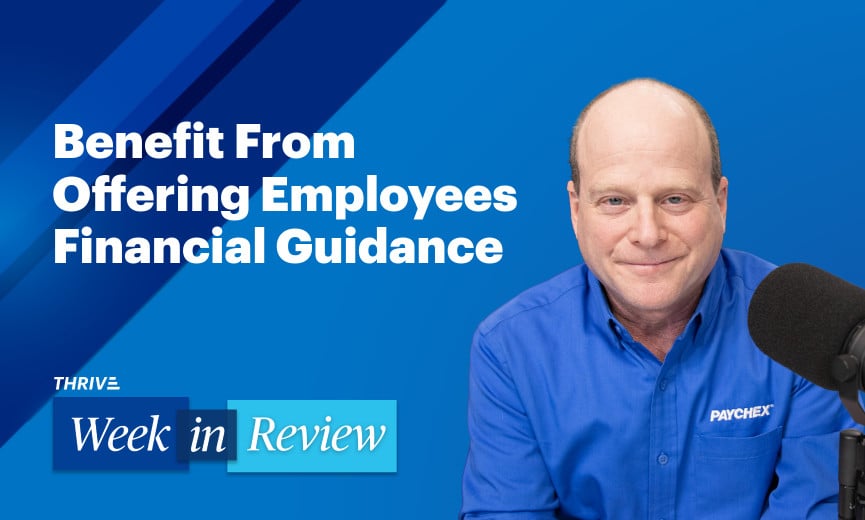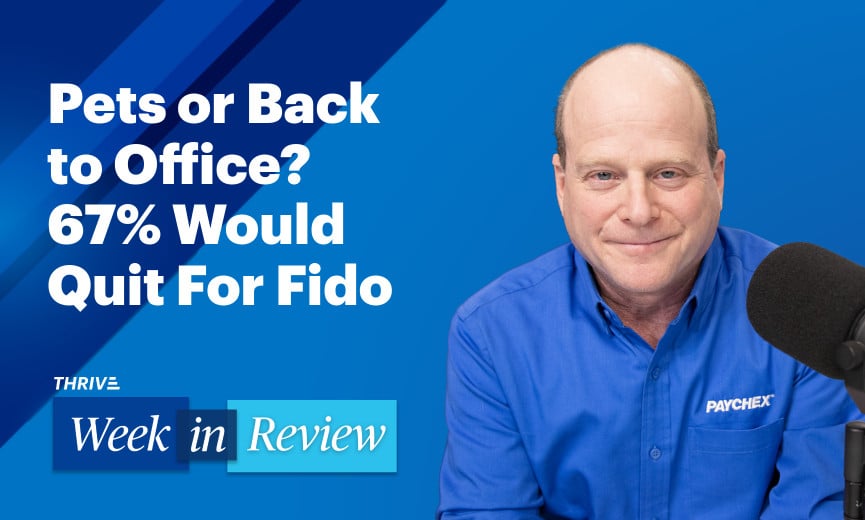- Thrive
-
Temporada
5Episodio43
Mejora en la fabricación, las preocupaciones sobre los costos del cuidado médico, las prestaciones voluntarias y la ética
Podcast •
Vea
Resumen
If you’re a small business in the U.S. manufacturing sector, a collaboration between the SBA and DOL provides more access to training, funding, and data to connect your business to domestic suppliers. Gene Marks also highlights the red flag a health insurance CEO is waving about the impact of massive Medicare cuts on employer and employee costs, suggesting owners start reviewing their budgets. Perks such as pet insurance and even covering bike rentals are becoming more prevalent to talent acquisition with 67% of employers citing the importance of voluntary benefits. And mind your ethics because employees are watching and making their decisions based on owner actions.
Ver transcripción
Hey, everybody, it's Gene Marks, and welcome to this week's episode of the Paychex THRIVE Week in Review podcast. This is where we take a few items to the news each week and we see how it impacts your small business and mine with a few comments from me if I have anything to share. Well, anyway, let's get to the news, shall we?
The first comes from the Small Business Administration and the Department of Labor. This was reported on smallbiztrends.com last week, and the news is that the Small Business Administration (SBA) and the Department of Labor (DOL) have taken a significant step to bolster American manufacturing with the signing of a new memorandum of understanding.
This agreement aims to streamline collaboration and data sharing to support domestic producers, and a staggering 98 percent of these are small businesses. So, what does this mean for you as a small manufacturer? Maybe you want to start up a manufacturing business or maybe you already own one, as well.
Well, the memorandum of understanding comes with these key benefits, right? Number one, there will be enhanced training programs. There will be an expansion of the registered apprenticeship program, which means that more skilled workers entering the manufacturing sector. This will help businesses find employees with the right training and qualifications to meet their operational needs.
Number two, there will be more access to financial resources. The SBA will provide cross-training to Department of Labor people on various loan programs, including their 7(a) and 504 loan programs. These loans can be pivotal in helping small businesses finance their necessary growth.
Number three, there will be a streamlined interagency cooperation, a more coordinated approach between the SBA and Department of Labor. It'll lead to more efficient delivery of resources.
And finally, it will mean a lot of support for domestic suppliers. Through initiatives like the onshoring portal, small businesses can now connect with over a million domestic suppliers. This empowers job creators to shift supply chains back to the U.S., promoting local economic growth and reducing reliance on foreign entities.
So, what do you do? Well, if you're a small manufacturer in this country, I strongly recommend that you reach out to your local Small Business Administration Office or Small Business Development Center that's near you. I think you should spend some time on their website, as well. Learn more about these programs. You can get enhanced support for training for financing and for finding suppliers for your manufacturing business, as well. New programs that should be of very much of interest to you.
The next bit of news is a survey that was taken or, actually, not necessarily a survey, but it was a statement that was made by a guy named Alan Cohen who is the chief operating officer of Centivo. They are a self-funded insurance program in the United States. He is warning of significant increases to healthcare costs this year.
There is billions in Medicaid cuts looming. Employers should expect more pressure on the commercial market, he says. They are estimating the cuts to Medicare spending in the “One Big Beautiful Act” will add about $443 billion to hospitals uncompensated care costs from 2025 to 2034. Employers often shift rising costs to their employees, and we are getting to the end of how high deductibles go according to Mr. Cohen.
He is saying that cost increases can be as high as 15 to 20% and he is warning and urging small businesses and businesses of all sizes to start taking a closer look at their health insurance because that will also have an impact on to how you manage these costs. Finding the highest-performing, most-effective cost providers is one lever for reducing costs without sacrificing quality.
So again, this one executive from a company called Centivo. This is reporting in beckerspayer.com is warning businesses of significant increases to healthcare costs potentially because of the cuts that are being made to Medicaid and other programs in the “Big Beautiful Bill” which is going to put more pressure on hospitals and healthcare systems and therefore force them to raise their costs which ultimately trickle down to businesses paying insurance.
The third bit of news that I wanted to share with you today also has to do with HR and employee benefits. According to a new survey nearly one in three employers plan to expand their voluntary benefits by 2027. This is a July 9 report from Gallagher Insurance.
In a survey of more than 4,000 US organizations, 67% agree that voluntary offerings are important component of a comprehensive financial well-being strategy. What do we mean by voluntary benefits that are offered? Well, the ability to get discounted identity theft protection and legal plans and other quality of life products like being able to buy discounted pet insurance or accident insurance or participating in employee perks programs, as well.
About half of the employers that they serve said that their employees participate in these kinds of employee perks program. Some quality-of-life products may capitalize on optics but not quality. So, Gallagher is telling employers to be careful about that.
Other unique benefits have emerged for talent acquisition and retention, including lifestyle spending accounts, sabbatical expenses, points reward systems, and, according to Gallagher, companies are turning to creative benefit strategies such as meal vouchers, free bikes, and taxi rides on holidays to offer attractive and personalized total rewards packages to top talent.
So, it's not just retirement or PTO or health care. There's a lot of additional voluntary benefits that are being offered either free or with discount by employers, and those are increasing in popularity.
Finally, we have one final report that came from a company called Resume Now and it has to do with workplace retention. Are you ready for this? Nearly half of workers have considered quitting over their employers ethics, according to Resume Now. Workers express concerns about their employers actions not aligning with its established value. At the same time, 36 percent said they stayed quiet about unethical activity to protect their job.
This was a survey of 1,000 U.S. workers. Forty-three percent said they've seen favoritism and promotion of raises, 21% saw retaliation occur after someone spoke up. Another 9% said diversity, equity and inclusion efforts seem to exist only for show and only one-third said they haven't seen any of those issues.
According to an expert at Resume Now, favoritism, retaliation, and performance diversity efforts are red flags for any workplace for employees seeing these behaviors signals that ethics are conditional and not universal. Bad leadership can undermine a workplace's ethics and in doing so undermine employees sense of safety and trust.
So, watch your ethics because a lot of employees are watching you and quite a few of them are considering quitting their jobs based on the ethics of their employers.
My name is Gene Marks, and you have been watching or listening to this week's episode of the Paychex THRIVE Week in Review. Hopefully you've enjoyed and gotten some good information from this.
If you would like some other information and help and advice to run your business, sign up for a Paychex THRIVE newsletter. Go to paychex.com/thrive. You can get all the information there as well as links to back episodes of this podcast.
Thanks so much for watching or listening. We will see you again next week with more stories in the news that impact your business. Take care.
Do you have a topic or a guest you’d like to hear on THRIVE. Visit payx.me/thrivetopics and send us your ideas or matters of interest. Also, if your business is looking to simplify your HR, payroll, benefits or insurance services, see how Paychex can help. Visit the resource hub at paychex.com/worx. That’s W-O-R-X. Paychex can help manage those complexities while you focus on all the ways you want your business to thrive.
I'm your host, Gene Marks, and thanks for joining us.
This podcast is property of Paychex, Incorporated, 2025. All rights reserved.

 Apple Podcast
Apple Podcast Spotify
Spotify iHeartRadio
iHeartRadio









